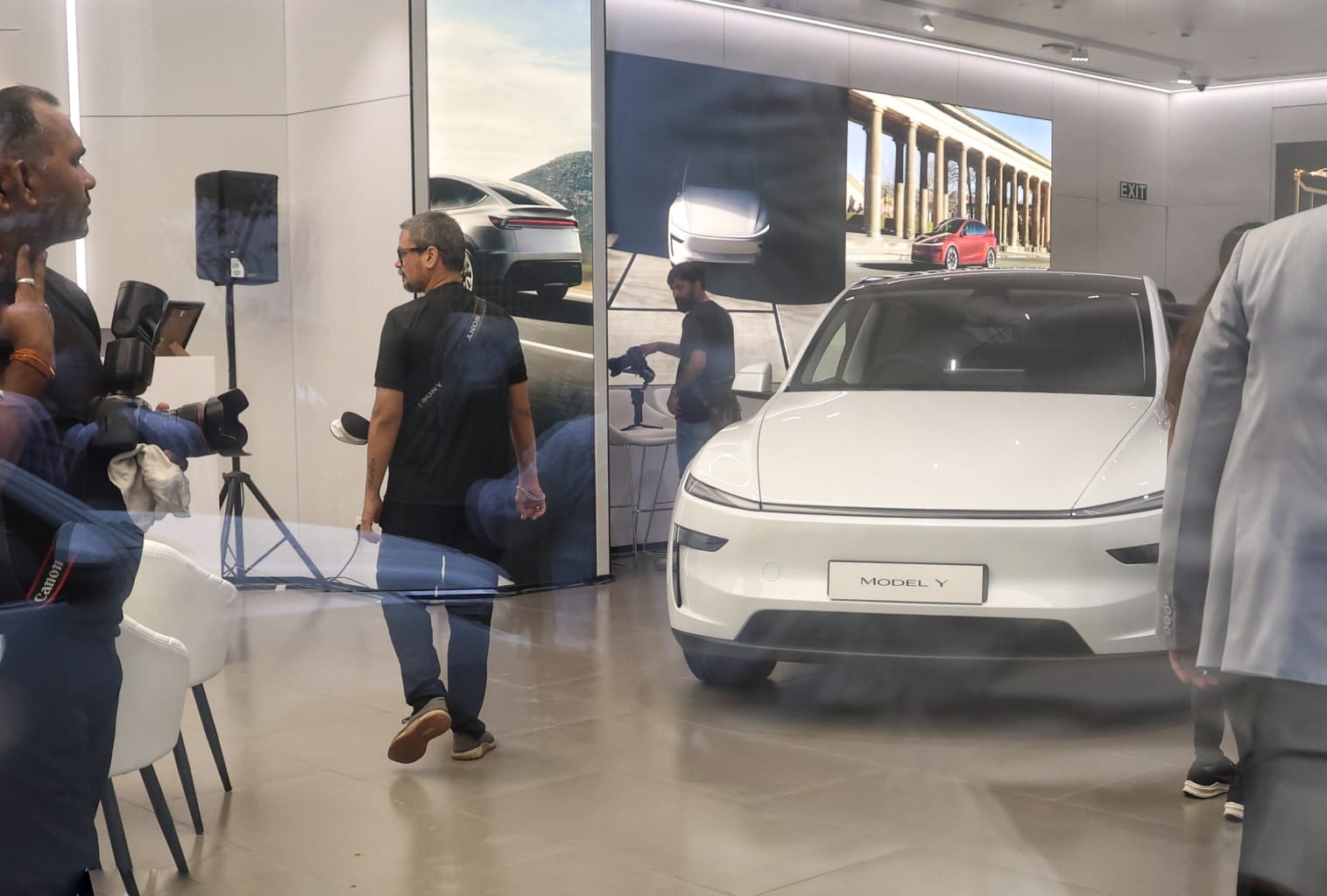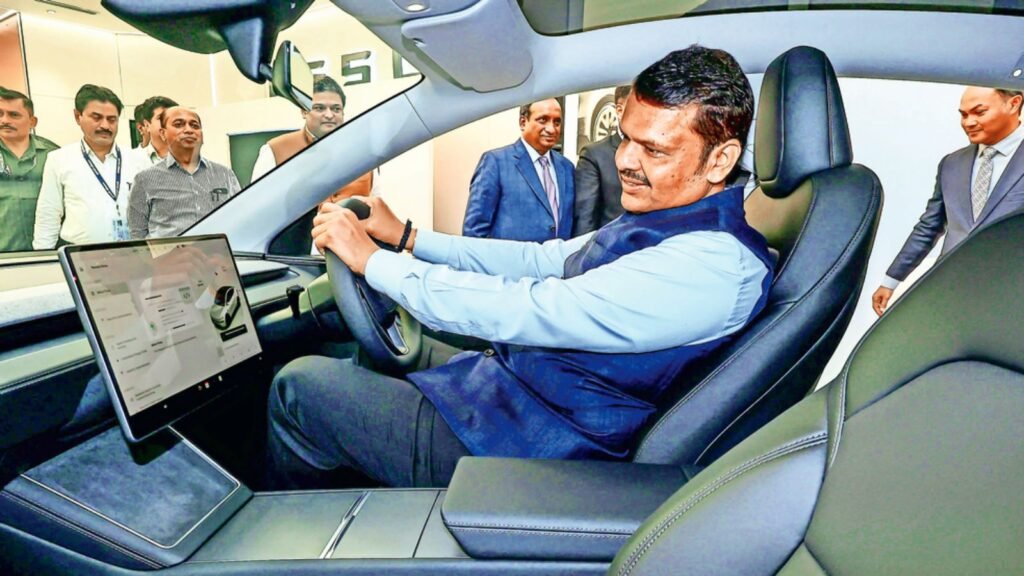ELON MUSK’S Tesla, the global electric vehicle (EV) giant, made its official entry into India Tuesday, launching its first showroom in Mumbai and showcasing its Model Y SUV.
Inaugurating the showroom in Mumbai, Maharashtra Chief Minister Devendra Fadnavis said: “This is not just the inauguration of an experience centre but a statement that Tesla has arrived, in the right city and state, that is Mumbai, Maharashtra. Mumbai stands for innovation and sustainability.”
The entry marks a close to a long-winding, topsy-turvy journey around Tesla’s touted entry in India’s nascent and slowly growing EV market, after the company criticised India for having high import duties.
The Model Y SUV will come in two variants: the standard rear-wheel drive option with a claimed range of 500 km, priced at close to Rs 60 lakh, and a long range version with a claimed range of 622 km, which would cost close to Rs 70 lakh. Deliveries are expected to begin from the final quarter of 2025. The car can be registered in Delhi, Gurugram and Mumbai.
Tesla Model Y will also be able to be upgraded to full self-driving capabilities in the future, which would cost an extra Rs 6 lakh. “The activation and use of these features are dependent on achieving reliability far in excess of human drivers as demonstrated by billions of miles of experience, as well as regulatory approval, which may take longer in some jurisdictions. As these self-driving features evolve, your car will be continuously upgraded through over-the-air software updates,” Tesla said.
Incidentally, the car is twice as expensive in India compared to the US, where it costs around $38,000 (roughly Rs 33 lakh), owing to India’s high import duty on completely built units (CBUs). Tesla has no plans of manufacturing in India for the time being, Union Heavy Industries Minister H D Kumaraswamy had said last month.
 The Tesla Model Y is a luxury SUV with a range of up to 622 km. (Express Photo)
The Tesla Model Y is a luxury SUV with a range of up to 622 km. (Express Photo)
In the slow lane
The announcement of one of its models marks a close to the long-awaited entry of Tesla into India, after founder Elon Musk had criticised the country’s high import duty structure. In 2021, responding to queries on social media about Tesla’s launch in India, he had said, “We want to do so, but import duties are the highest in the world by far of any large country!” Import duties in India for such cars can go as high as 110 per cent.
Story continues below this ad
In 2016, Musk had announced that pre-bookings for its Model 3 would be available for customers from many countries outside North America, including India. Soon, many customers in India put up a refundable deposit of $1,000 (approximately Rs 85,000 at current exchange rate). However, earlier this year, the company initiated refunds to those who had paid the reservation fee as the Model 3 has been discontinued.
Wooing Tesla
After receiving complaints about the high duty structure, the government last year released a new EV policy, easing duty for a limited number of imports for manufacturers setting up facilities here with a minimum investment of Rs 4,150 crore. This was largely seen as an attempt to woo Tesla.
In turn, they will be eligible to import a maximum of 8,000 CBUs of electric four-wheelers per year, with a minimum import value of $35,000 at a reduced Customs duty of 15 per cent for a five-year period. The scheme is limited to global manufacturers with a revenue of at least Rs 10,000 crore per year, with fixed assets valued at a minimum of Rs 3,000 crore.
Currently, the customs duty on cars imported as CBUs is either 60 per cent or 100 per cent, depending on engine size and whether the cost, insurance, and freight (CIF) value is higher or lower than $40,000. Where the car costs $40,000 or more, the duty is 100 per cent; a cheaper car attracts 60 per cent.
Story continues below this ad
In 2021, Tesla had written to nodal central ministries seeking a reduction in import duties on fully assembled cars and had asked for duties to be cut to 40-15 per cent depending on the price of the car. The new policy effectively fulfills that demand.
The government said the scheme is intended to promote EV manufacturing in India, a sector that is expected to grow into a major category within the automobile sector in the coming years. India is currently the third largest automobile market and one of the fastest growing automotive markets in the world. The current market size of the automotive sector is Rs 12.5 lakh crore and the sector is expected to cross Rs 24.9 lakh crore by 2030. The automotive sector contributes over 7.1 per cent to India’s GDP.
However, despite easing the norms, Tesla has yet to show interest in making its cars in India. The company has massive assembly operations in China, which is a key market for Tesla.
Last month, Kumaraswamy said Tesla was not interested in manufacturing in India but was looking at opening two stores. He, however, said global EV makers such as Mercedes-Benz, Volkswagen-Škoda, Hyundai and Kia have shown interest in applying under the ministry’s flagship Scheme to Promote Manufacturing of Electric Passenger Cars in India, notified in March last year.

